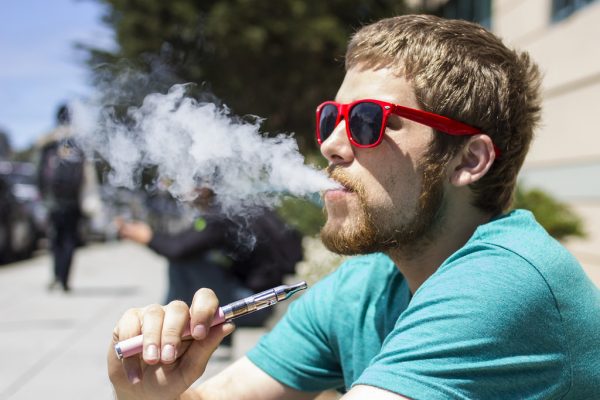The Food and Drug Administration released a new proposal April 24 to regulate e-cigarettes, which could be a significant step toward helping college students breathe more easily.
The proposal would ban the sale of e-cigarettes, battery-powered devices that turn nicotine and other chemicals into a vapor that can be inhaled, from vending machines, require disclosure of product ingredients and prohibit manufacturers from selling their products without a warning label.
 Devon Vining, a senior cinema major smokes an electronic cigarette at the designated smoking area near the Humanities building Mon. May 5, 2014. Photo by Tony Santos / Xpress
Devon Vining, a senior cinema major smokes an electronic cigarette at the designated smoking area near the Humanities building Mon. May 5, 2014. Photo by Tony Santos / Xpress
Health Educator Christine Morley, who does outreach around smoking, tobacco and e-cigarette use, said that she thinks the new rules would allow college campuses to regulate the use of e-cigarettes along with other tobacco products that they restrict.
[HTML1]
“It lets students know more what they are putting in their body and allows them to make a more informed decision in regards to using them,” said Morley.
Morley mentioned that e-cigarettes contain nicotine, which is addictive, and could be the reason why students who are occasional smokers will become regular smokers during college. E-cigarettes also contain carcinogens and other hazardous chemicals such as diethylene glycol, which is found in antifreeze, according to Morley.
But that doesn’t stop some students from using them.
Peter Wu, a junior sociology major, smokes his vaporizer every day to cut down on tobacco use. He has smoked tobacco for nine years and recently noticed a difference between smoking tobacco and using a vaporizer.
“Before I started vaping I would cough up dark to almost black stuff in the mornings and that same stuff started to clear up since I started vaping,” said Wu. “I will continue to vape, despite all of the negative media about it, because I know that it works.”
Erik Peper, a health education professor, said he agrees with the new regulations, mentioning that there should be restrictions on how e-cigarettes are marketed toward students. He said that he agrees with Wu’s comment, adding that some students believe vaporizers are less harmful than regular cigarettes because the long term effects on the body from inhaling them are unknown.
E-cigarettes come in fruit and candy flavors, which Morley said is partly why they have become more socially acceptable than regular cigarettes.
“I think there is a novelty around using them as well, that they are the ‘cool’ thing to use and try right now,” said Morley. “And the common misconception is that they are less addictive and healthier than regular cigarettes.”




